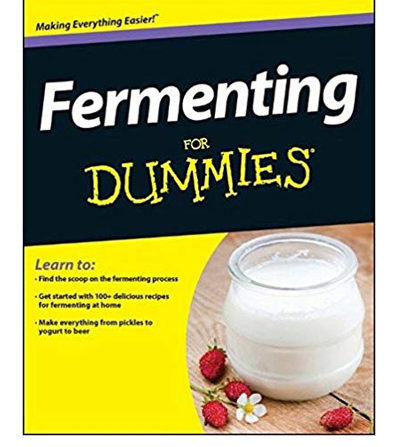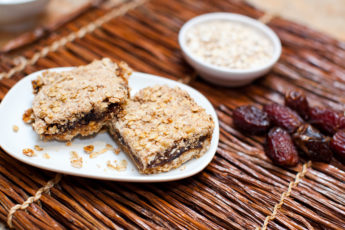I am very happy to announce the release of my book Fermented Foods for Dummies on October 7th! You can Order it now!
It’s a great resource for anyone interested in learning more about the amazing benefits of fermented foods and how to make & enjoy these nutritious wonders at home.
To celebrate the release of my book, I wanted to post an article I wrote about the benefits & uses of fermented foods…
Did You Thank Your Gut Today?
Did you start your day with kefir in your smoothie? Wash down your lunch with a glass of kombucha? How about pickles or kimchi for dinner? Chances are you didn’t eat anything fermented today. If you did, congratulations! Your gut says ‘thank you!’
Fermented foods are more common than we think and play a pretty big role in our lives. What is a fermented food? Essentially, fermenting means converting the carbohydrate in foods into alcohol (not the kind that gets you drunk, but we’ll get to that!). Examples of fermented foods are Kombucha, Sauerkraut, Kimchi, Vinegar Tempeh, Miso, Yogurt, Kefir and Pickles to name a few. So why are these foods important?
Fermented foods have a lot of health benefits. They are rich in enzymes, which help digestion and absorption occur a lot faster in our system. They are also rich in good bacteria, specifically lactobacillus acidophilus, which is an extremely beneficial flora found in the gut. By consuming healthy bacteria, such as the ones found in fermented foods, you can actually restore and re-balance the flora in your gut. This can lead to better vitamin and nutrient absorption. On a side note, fermented foods have a long shelf life without containing harmful preservatives, so you can enjoy your food longer without spoilage.
In fairness to those who oppose fermented foods in the diet, I will point out that in some cases they can be harmful. Food that has not been fermented properly can lead to botulism, which can make you really sick. Also, fermented foods can contain a lot of salt, so if you were concerned about your sodium levels being too high it would be wise to monitor your salt intake when consuming fermented foods. That being said, any negatives that come from the high sodium content are counteracted by the benefits of a healthy flora.
Let’s look at the benefits of certain types of fermented foods.
Kombucha — a fermented drink made from tea, sugar, bacteria and yeast. It’s readily available at health food stores and even some grocery stores. Kombucha is fizzy, light and refreshing and comes in a variety of flavors. It’s like drinking natural soda! Benefits include improvement in digestion and liver function, as well as stimulation of the immune system. Kombucha does not have a high salt or sugar content and can be enjoyed daily.
Sauerkraut — fermented cabbage. It can be made with two ingredients: salt and cabbage. Korea has a version of sauerkraut called Kimchi, which is fermented spiced cabbage. Sauerkraut and Kimchi contain beneficial bacteria that help with the digestive process. Research links Kimchi to high antibiotic potency and longevity. Sauerkraut and Kimchi can be used as a garnish or added to salads and sandwiches.
Miso — a thick paste made from fermented soybeans. During the soybean fermentation process, grains like barley, rice, or buckwheat may be added to achieve a certain flavor or desired attribute. In most situations, soybeans serve as the basis for miso fermentation. Miso is a great source of magnesium and zinc—two important mineral antioxidants. Miso also contains healthy bacteria that supports intestinal microflora and contains the amino acid tryptophan, which is important for sleep. It’s also a great source of dietary fiber. Miso can be used to add flavor to soups, sauces, marinades, salad dressings or vegetables dishes.
Coconut Yogurt or Kefir — similar to milk kefir without the dairy, Coconut Yogurt is fermented coconut milk. It contains a host of probiotic cultures, which support your intestinal system. It contains several major probiotic strains that are not found in yogurt. Coconut Kefir helps to minimize sugar cravings. Because it isn’t made from animal milk, people who are lactose intolerant can consume Coconut Kefir without the nasty side effects. You can enjoy this beverage on its own or in a smoothie. You can also make it into a dip.
If you aren’t going to make your own, Yoso will make it for you!
Tempeh — made from cooked and fermented soybeans that have been formed into a patty. Tempeh is an excellent and easily digestible source of vegetarian protein. The protein and fiber also controls blood sugar levels. The fiber content in tempeh is beneficial to your gastrointestinal health. It contains a large amount of magnesium and calcium. You can eat tempeh on its own, in a sandwich, in salads, in soups or in a stir-fry.
Try to include at least 1-2 fermented foods in your diet everyday. At the very least a few times a week. It can either be eaten as a side on your plate, a condiment on your favourite food, like Sauerkraut or Miso, or the focus of your meal, such as tempeh or coconut kefir. Fermented foods are fun to eat and fantastic for your body’s function- you will notice a difference!



